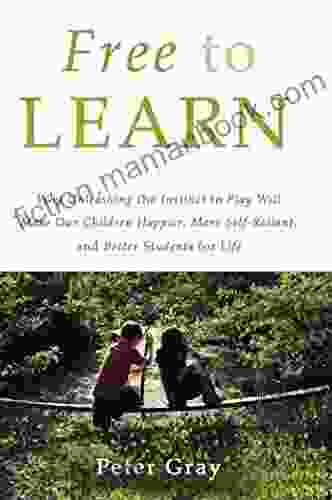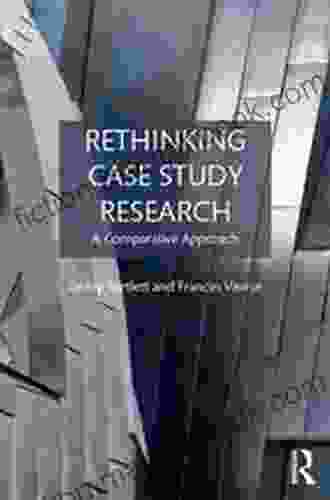Rethinking Case Study Research: A Comparative Approach to Uncover Deeper Insights

Case study research has long been a valuable tool for researchers seeking to gain a detailed understanding of complex phenomena within their real-world contexts. However, the traditional approach to case studies, which often focuses on a single case, may limit the researcher's ability to draw broader generalizations and uncover deeper insights. 4.5 out of 5 This article advocates for a comparative approach to case study research. By comparing multiple cases, researchers can identify patterns, similarities, and differences that would not be apparent when examining a single case in isolation. This approach enhances the rigor and validity of case study research and allows researchers to develop more nuanced and comprehensive understandings of the research topic. While the comparative approach offers numerous benefits, it also presents some challenges that researchers should consider: Adopting a comparative approach in case study research offers significant advantages for researchers seeking to gain a deeper and more comprehensive understanding of complex phenomena. By comparing multiple cases, researchers can enhance the generalizability, validity, and insights derived from their research. While this approach presents some challenges, careful planning and execution can mitigate these challenges and yield rich and valuable findings. Researchers are encouraged to embrace the comparative approach and explore its potential to advance their case study research. By ng so, they can contribute to the development of more robust theories, informed decision-making, and meaningful solutions to real-world problems.Language : English File size : 958 KB Text-to-Speech : Enabled Screen Reader : Supported Enhanced typesetting : Enabled Word Wise : Enabled Print length : 139 pages Benefits of a Comparative Approach
Steps in a Comparative Case Study Research
Challenges and Considerations
References
4.5 out of 5
| Language | : | English |
| File size | : | 958 KB |
| Text-to-Speech | : | Enabled |
| Screen Reader | : | Supported |
| Enhanced typesetting | : | Enabled |
| Word Wise | : | Enabled |
| Print length | : | 139 pages |
Do you want to contribute by writing guest posts on this blog?
Please contact us and send us a resume of previous articles that you have written.
 Top Book
Top Book Novel
Novel Fiction
Fiction Nonfiction
Nonfiction Literature
Literature Paperback
Paperback Hardcover
Hardcover E-book
E-book Audiobook
Audiobook Bestseller
Bestseller Classic
Classic Mystery
Mystery Thriller
Thriller Romance
Romance Fantasy
Fantasy Science Fiction
Science Fiction Biography
Biography Memoir
Memoir Autobiography
Autobiography Poetry
Poetry Drama
Drama Historical Fiction
Historical Fiction Self-help
Self-help Young Adult
Young Adult Childrens Books
Childrens Books Graphic Novel
Graphic Novel Anthology
Anthology Series
Series Encyclopedia
Encyclopedia Reference
Reference Guidebook
Guidebook Textbook
Textbook Workbook
Workbook Journal
Journal Diary
Diary Manuscript
Manuscript Folio
Folio Pulp Fiction
Pulp Fiction Short Stories
Short Stories Fairy Tales
Fairy Tales Fables
Fables Mythology
Mythology Philosophy
Philosophy Religion
Religion Spirituality
Spirituality Essays
Essays Critique
Critique Commentary
Commentary Glossary
Glossary Bibliography
Bibliography Index
Index Table of Contents
Table of Contents Preface
Preface Introduction
Introduction Foreword
Foreword Afterword
Afterword Appendices
Appendices Annotations
Annotations Footnotes
Footnotes Epilogue
Epilogue Prologue
Prologue Peter Robison
Peter Robison Silke Labudda
Silke Labudda Kathryn H Jacobsen
Kathryn H Jacobsen Gabe Brown
Gabe Brown Laura Bellmont
Laura Bellmont Laura Madeleine
Laura Madeleine Peter Gray
Peter Gray Laurel A Rockefeller
Laurel A Rockefeller Ward Larsen
Ward Larsen Sherrinda Ketchersid
Sherrinda Ketchersid Thomas Sewell
Thomas Sewell Elizabeth Coffey
Elizabeth Coffey Gregory Maguire
Gregory Maguire Howie Kahn
Howie Kahn Michael Troy
Michael Troy Gordon Mackenzie
Gordon Mackenzie Diane R Gehart
Diane R Gehart Jean Martin Fortier
Jean Martin Fortier Maria T Codina Leik
Maria T Codina Leik Ken Little
Ken Little
Light bulbAdvertise smarter! Our strategic ad space ensures maximum exposure. Reserve your spot today!
 Brenton CoxFollow ·13.3k
Brenton CoxFollow ·13.3k Darrell PowellFollow ·19.8k
Darrell PowellFollow ·19.8k Elliott CarterFollow ·6.2k
Elliott CarterFollow ·6.2k Derek BellFollow ·19.1k
Derek BellFollow ·19.1k Eric NelsonFollow ·2.1k
Eric NelsonFollow ·2.1k Jake CarterFollow ·16.4k
Jake CarterFollow ·16.4k Dwight BlairFollow ·9k
Dwight BlairFollow ·9k Hugh ReedFollow ·17.1k
Hugh ReedFollow ·17.1k

 Abe Mitchell
Abe MitchellWhy Unleashing the Instinct to Play Will Make Our...
Play is an essential part of childhood. It is...

 Rubén Darío
Rubén DaríoTheory in Health Promotion Research and Practice
Theory is essential...

 Howard Blair
Howard BlairFailing Students or Failing Schools: Uncovering the Root...
In the United States, the issue of failing...

 Ira Cox
Ira CoxPoetry From the Heart Chope: A Symphony of Soul and Verse
Embark on a literary...

 Easton Powell
Easton PowellThe Witch Hunt: Wicked Witches of Shadow Woods
In the cursed woods of...
4.5 out of 5
| Language | : | English |
| File size | : | 958 KB |
| Text-to-Speech | : | Enabled |
| Screen Reader | : | Supported |
| Enhanced typesetting | : | Enabled |
| Word Wise | : | Enabled |
| Print length | : | 139 pages |













